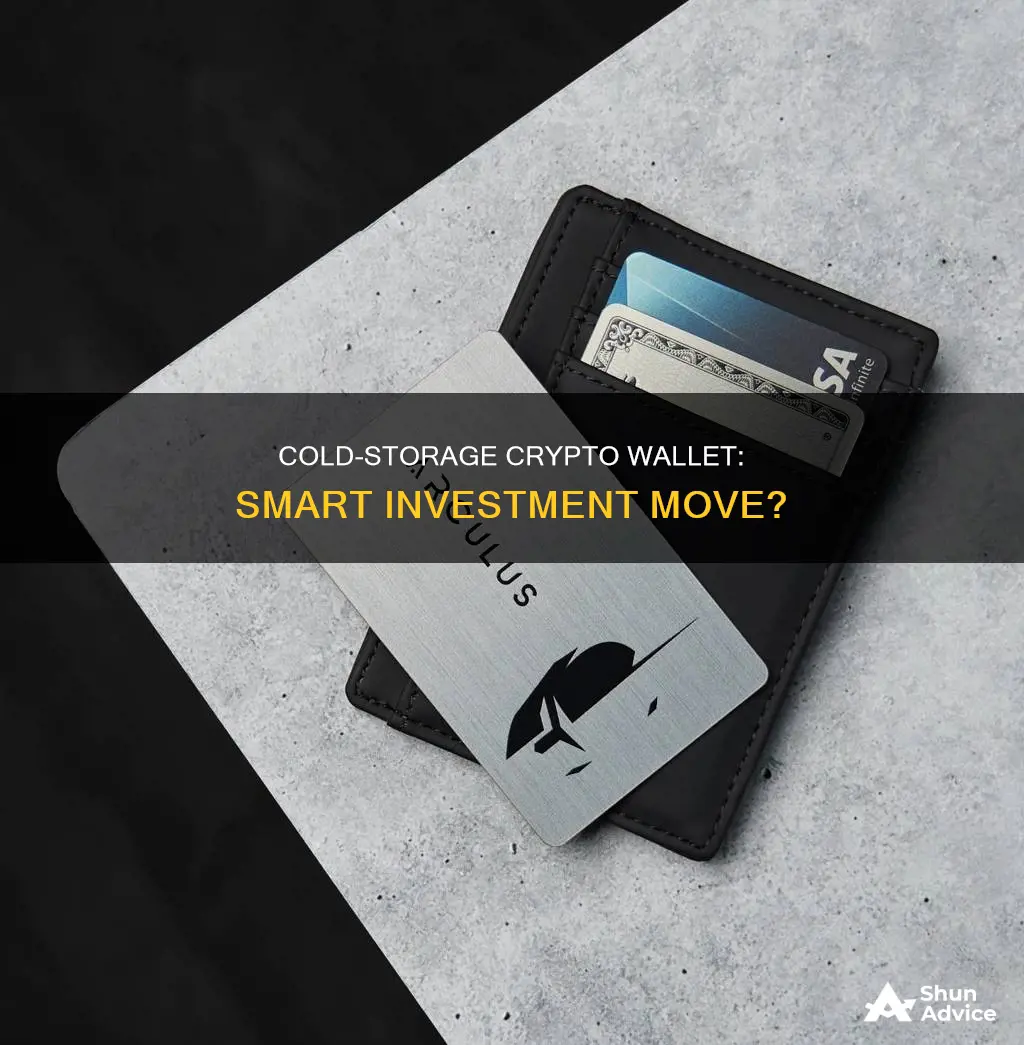
In the world of cryptocurrency, security is paramount. Cold wallets, also known as cold storage solutions, are devices that protect users' crypto by generating and storing their private keys offline. They are considered more secure than hot wallets, which are connected to the internet. Cold wallets are a smart investment for those who use crypto as they are currently the most secure method for securing private keys.
What You'll Learn

Cold wallets: what are they and how do they work?
Cold wallets are a type of cryptocurrency wallet that stores your private crypto keys offline, usually on a physical device. They are also known as hardware wallets and they protect your digital crypto assets from online hackers. Cold wallets are a form of cold storage, which is a term used in the crypto world to refer to any method of storing cryptocurrencies offline.
Cold wallets work by storing your private crypto keys on a device that is not connected to the internet. This could be a USB drive-like device, a smart card, or even a piece of paper. To access your crypto keys, you connect the device to your computer or mobile device via USB or Bluetooth and use the cold wallet's mobile or desktop app. Cold wallets are generally password-protected, with some requiring a PIN code to access.
There are two main types of cold wallets: hardware wallets and paper wallets. Hardware wallets are physical devices that store your private keys offline, while paper wallets are simply pieces of paper with private keys printed on them, usually in the form of a QR code.
Cold wallets provide a high level of security for your crypto assets as they are immune to online threats like malware or spyware. By keeping your private keys offline, cold wallets protect your account from bad actors and on-chain threats such as malicious smart contract functions and apps.
It's important to note that while cold wallets offer excellent security, they are not completely immune to hacking attempts. If your device is stolen, your private keys could still be accessed by an unauthorised person. Additionally, there is a risk of physical damage or loss, especially with paper wallets.
A Beginner's Guide to Crypto Investing in Singapore
You may want to see also

Cold storage: pros and cons
Cold storage refers to storing your cryptocurrency keys in an offline device, such as a USB drive, or even a simple piece of paper. This method of storing cryptocurrency is often referred to as a "cold wallet". Cold storage is considered to be a more secure method of storage, as it is not connected to the internet and therefore cannot be hacked.
Pros:
- Significantly less vulnerable to cyberattacks.
- Can be carried around in your pocket.
- Allows you to be the sole custodian of your crypto assets.
Cons:
- Less convenient and more cumbersome to transfer funds.
- Requires a purchase, usually ranging from $60 to $170.
- May require some technical knowledge to set up.
- Prone to loss and damage.
- Limited access in an emergency.
Cold storage is a good option for those with large amounts of cryptocurrency or those who do not need to access their funds very often. It is a more secure method of storage but comes with the trade-off of being less convenient and accessible.
Litecoin: A Worthy Investment?
You may want to see also

Hot vs cold wallets: what's the difference?
Hot wallets and cold wallets are the primary means of storing and exchanging cryptocurrencies and tokens. Both types of wallets protect your public and private keys, which are cryptographically generated strings of letters and numbers that can authorise your crypto transactions. The right type of wallet for you depends on how much crypto you hold, your security preferences, and how easily accessible you need your funds to be.
Hot Wallets
Hot wallets are cryptocurrency wallets with an internet connection. They are software that stores your private keys on a device connected to the internet. They are accessible from internet-enabled devices such as mobile phones, tablets, and laptops. They are widely adopted because they make it easier to transfer and receive cryptocurrency.
Hot wallets are convenient to access and use for trading. They are also free, and some even pay interest on stored crypto. However, they are less secure than cold wallets because they are vulnerable to hacking.
Cold Wallets
Cold wallets, on the other hand, do not have an internet connection. They are offline and come in the form of a physical device, such as a USB stick. Cold wallets are hardware storage devices that keep your data offline. They are considered more secure than hot wallets because they are not connected to the internet or another device, so they are less susceptible to hacking.
Cold wallets are better suited for long-term storage. They are also a good option for safeguarding private keys. However, they require the purchase of an external device, which can cost around $50 to $200. They are also less convenient than hot wallets because they require power and an internet connection.
Best Practices
It is common for owners to have both types of wallets. A good practice is to keep long-term storage in cold wallets and short-term cryptos in hot wallets. This ensures that you have easy access to the cryptos you need while keeping the rest of your investment secure.
Gold Coin Collection: Smart Investment or Risky Business?
You may want to see also

How to recover a cold wallet
Cold wallets are a type of cryptocurrency wallet that stores your private keys offline, usually on a physical device, to protect them from unauthorized access. They are considered more secure than hot wallets, which are connected to the internet.
If you lose your cold wallet, you can recover your cryptocurrencies using your recovery seed (12, 18, or 24 words depending on the wallet). If you lose both your cold wallet and recovery seed, recovery is not possible.
- Order a new wallet. If your wallet has been stolen, it is recommended to make this a priority.
- Input your recovery seed into the new wallet.
- Access your coins and move them to new addresses. This is like a reset.
- If you still have access to your old wallet, wipe the device.
- Recover the new wallet with the word seed from the lost device.
- Send all of your coins to the public keys you previously noted down.
- Finally, wipe the new wallet and recover it with the new word seed.
- Keep your recovery seed offline, secure, and accessible.
- Use a stainless steel recovery seed backup tool.
- Memorize the seed.
- Store the seed in a fireproof and waterproof safe.
Mark Cuban's Dogecoin Investment: How Much?
You may want to see also

Cold wallet security: best practices
Cold wallets are a secure way to store your cryptocurrency keys offline, preventing theft by hackers. Here are some best practices to ensure the security of your cold wallet:
Backup Your Wallet Information
Make multiple copies of your seed phrase and store them in different locations. You can write them down on paper, engrave them on a titanium plate, or use a new technology such as Trezor's Shamir Backup, which protects against theft and destruction.
Beware of Phishing Scams
Scammers may attempt to trick you into giving up your personal information through text messages or emails. Be cautious of any emails or links requesting you to log into your account or provide sensitive information. Remember, legitimate companies will never ask for your seed phrase.
Purchase Devices from Authorized Retailers
When buying a new cold wallet device, always purchase from an authorized retailer or directly from the manufacturer. Avoid buying from third-party sellers on websites like Amazon or eBay, as there have been cases of unverified sellers distributing compromised devices.
Use a Secure Location
Keep your cold wallet device in a secure location, such as a fireproof and waterproof safe or safety deposit box. Additionally, consider using deep cold storage methods, which involve storing your device in an inconvenient location that requires time and effort to access, such as burying it in a waterproof container in your garden.
Enable Two-Factor Authentication (2FA)
Add an extra layer of security to your cold wallet by enabling 2FA. This will require an additional step, such as a code or biometric authentication, to access your wallet, making it more difficult for hackers to gain unauthorized access.
Use Complex and Unique Passwords
Strengthen your passwords by using complex strings of words with numbers and symbols. Avoid using the same password across multiple accounts, especially sensitive accounts related to banking, crypto, or email. Consider using a password manager to generate and store complex passwords securely.
Regularly Update Your Devices
Keep your devices, browsers, and computer operating systems up to date with the latest software, including antivirus programs and OS updates. This will help patch security vulnerabilities and ensure your cold wallet is protected against known threats.
Be Wary of Public Wi-Fi
Avoid accessing your cold wallet or conducting transactions over public Wi-Fi networks. If you must use public Wi-Fi, consider using a secure VPN connection to protect your sensitive information from potential eavesdroppers.
Diversify Your Wallets
Distribute your crypto assets across multiple wallets to minimize the impact of a potential breach. This way, if one wallet is compromised, you won't lose all your funds.
Regularly Review and Update Security Measures
Stay vigilant and keep yourself informed about new security threats and best practices. Regularly review and update your security measures to ensure your cold wallet remains protected against evolving hacking techniques.
Spot Bitcoin ETF: A Beginner's Guide to Investing
You may want to see also
Frequently asked questions
A cold-storage crypto wallet, also known as a cold wallet, is a device that stores your private keys offline, usually on a physical device. It is called cold storage because it is not connected to the internet.
Cold storage wallets generate and store your private keys offline. When you want to transfer cryptocurrency from your wallet, you set the transaction through an app or desktop software, and then verify the transaction on the cold wallet device.
Cold-storage crypto wallets are the most secure way to store your cryptocurrency. They are not susceptible to online hacks and security breaches, and they give you full control over your digital assets.
Cold-storage crypto wallets are less convenient than hot wallets. They are not as easy to access, and transactions can take longer. Cold wallets are also hardware devices, so they are prone to loss and damage.







